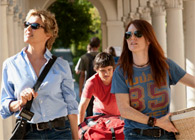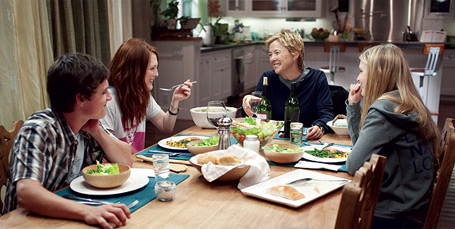There are several scenes with naked bodies, consumed with lust. In every one of them, it was a male shagging a female. The Board of Film Censors (BFC) seemed to have no problem with that, not mentioning these scenes as among the reasons for the extra-restrictive condition they imposed on the film The Kids Are All Right. Not only did they rate the film R21, they confined it to one print for the whole of Singapore, effectively making it impossible to screen the movie at more than one cinema at a time. This is a never-before imposed condition outside of film festivals, said the [Singapore] Straits Times.


There’s even a scene where two women were having sex, but under a duvet. You don’t see any skin. The BFC seemed not to have any problem with that either, not mentioning it as among the reasons for their decision.
Instead, they reason they gave was that the film “normalised” the “homosexual lifestyle”.
Actually, the film contained no hint of the “homosexual lifestyle” as commonly signified by this strange term so beloved of Christian fundamentalists. It’s fantastic how the BFC considered the film could normalise the “lifestyle” when the “lifestyle” was not in evidence at all.
* * * * *
Lisa Cholodenko’s family comedy won praise from the New York Times for being “canny in its insights and... agile in its negotiation of complex emotions”, yet “outrageously funny without ever exaggerating for comic effect, and heartbreaking with only minimal melodramatic embellishment.”
As mentioned in my earlier post, In Singapore, some thoughts are not All Right, the film was nominated for four Oscars including Best Picture and Best Original Screenplay. It was written by Lisa Cholodenko and Stuart Blumberg.
The point of departure from conventional family comedies comes from the tiny fact that the family in the film is headed by two women: Nic, a lesbian doctor (Annette Benning) and Jules, a bisexual homemaker and now landscape designer-wannabe (Julianne Moore). They have two children, 18-year-old Joni (Mia Wasikowska) and 15-year-old Laser (Josh Hutcherson), from the same anonymous sperm donor.
All the other characters around the family, including Laser’s friend Clay (Eddie Hassell) — the two boys snoop around Nic and Jules’ bedroom, finding porn — have no negative reaction to a same-sex household. It’s treated in a matter-of-fact way. The BFC and its Consultative Panel were probably outraged that such a family is premised as sober reality — which tells you nothing about such families, but a helluva lot about the closed minds in the BFC and the Consultative Panel.
Presenting it as sober reality won’t do. The BFC requires that Singaporeans be judgemental about it, preferably in an old-Testamental fire-and-brimstone way.
With his sister turning eighteen, Laser asks her to use her new adult status to discover the identity of their sperm-donor father through the sperm bank, and when the sperm bank contacts Paul (Mark Ruffalo) to ask if they could release his name, he says Yes without giving it much thought.
The stage is now set for the introduction of someone, at once an outsider and yet very intimately an insider, into the family circle. Paul is a laid-back kind of guy, albeit a successful small-restauranteur; he is charming and easy-going where the two women are more uptight, even controlling. The dynamics of the family spins. Things get awkward at times, exacerbated by the teenagers beginning to assert themselves as they grow older. Unsurprisingly, the mothers feel a little threatened by Paul’s arrival. How much should Paul be allowed into the family? How free should each of the children be to decide for themselves their relationships with him? Meanwhile, there is a little ‘taking-each-other-for-granted’ malaise in the relationship between the two women, a scenario that is common in many marriages of long duration, thus adding more fragility to the situation.
In its own light-hearted way, the film leads its audience to think about issues that are now timely: families created by sperm and ovum donation (and increasingly, surrogate pregnancy) and how we deal with issues of supplementary parents, and same-sex couples settling down and raising children — which is a fact of life nowadays whatever cultural dinosaurs may wish to think. By putting roadblocks through censorship on examination of these issues, our government is doing nothing except to ensure that Singaporeans remain social illiterates when they have to confront these questions that now arise here and elsewhere. It’s like designing a school reading list that insists that children shall not be exposed to the idea that the earth is spherical.
There was a time when even the depiction of any less-than-completely-heterosexual character was taboo for Singapore. That was an even slimmer reading list; homosexuality was supposed to remain unspeakable, and therefore unrepresentable.
When it became too hard to deny, a concession was made. Yes, it can be represented, but only in ways that reinforce the moral and social superiority of heterosexuality. The homosexual character had to live the “homosexual lifestyle”: He or she had to be promiscuous, sex-obsessed, self-destructive, irresponsible to family and society, better yet criminal, drug-addicted and infected.
And that was what our R21 rating was supposed to be — an isolation chamber to hold the infectious antigen that was homosexuality and its degenerate “lifestyle”. It could even hold a bit of its wanton sex (so long as it was not explicit, as our censorship guidelines say).
Thus, Brokeback Mountain was rated R21 and given wide release, but then its gay characters ended up unhappy, so that’s all right. I Love You, Philip Morris was rated R21 and given wide release too, but then its gay characters were criminals.
However, now comes a film that depicts a different reality, though one that has always existed: gay parents raising children well. Nic and Jules are occasionally floored by difficulties in maintaining a relationship and a household, and are sometimes flummoxed by growing teenagers and their unpredictable ways, but in the end, they apply common sense and manage to cope. Joni and Laser are well-adjusted kids, doing well in school and (most of the time) able to resist peer pressure.
There is no “homosexual lifestyle” in sight. No promiscuity, sex-obsession, self-destructiveness, irresponsibility to family and society; no criminality, drug-abuse or lethal infections.
Oh wait, I take it back. The heterosexual characters in The Kids Are All Right have (some of) those traits. There is Paul who is screwing any female who sashays by. There is Clay who introduces Laser to cocaine, and so on. In the midst of all that, the core family stays level-headed. Damn!
This won’t do. The R21 isolation chamber is not designed for this: a “gay” film that is not sordid.
It’s terrifying. This film subverts the belief that heterosexuality has a monopoly on the moral and the good, thus it is even more threatening than gay sex. It upturns the notion that having an adult dick and an adult pussy together surely makes for a happy family by advancing the heresy that parenting skills are more important. The entire premise is an outrageous oxymoron: conservative homosexuality. Indeed, as the BFC said to Straits Times, it’s already a huge concession that the film was rated R21 and allowed one print for circulation. They should count themselves lucky the distributors do not face charges under the Sedition Act for undermining our national ideology.












 Printable Version
Printable Version










